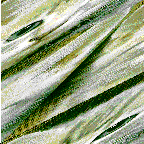  | |||
| Arnold's cat, | by Leon Poon | ||
COURSE DESCRIPTION: Graduate level introduction to modern theoretical physics and mathematics techniques for study of low-dimensional dynamical systems. The emphasis is on the interplay between the geometry and the statistical mechanics associated with the dynamics. The course has much in common with (and complements) graduate level field theory and statistical mechanics courses; partition functions and transfer operators are applied to computation of correlations and spectra of classical and quantum chaotic systems.INSTRUCTOR: Predrag Cvitanović
OFFICE: Howey W501
PHONE: 404/385-2502
EMAIL: predrag.cvitanovic@physics.gatech.edu
INSTRUCTOR HOMEPAGE: www.cns.gatech.edu/~predrag
COURSE HOMEPAGE: www.cns.gatech.edu/~predrag/courses/PHYS-7123-03
TIME: Fall semester 2003, TR 9:35-10:55
ROOM: Howey S106
EXPECTED ENROLLMENT: 15
  | |||
| Arnold's cat, | by Leon Poon | ||
e-TEXTBOOK:
Chaos: Classical and Quantum
webbook, available on
www.cns.gatech.edu/ChaosBook.
We will cover both the classical and quantum chaos in a 2-semester
sequence (either part can be taken separately). The theory will be
extended to quantum mechanics via Gutzwiller and Selberg trace formulas.
This sequence is the last (?) prepublication test run of the web
e-textbook. Your active participation in improving the book is very much
encouraged.
PREREQUISITES:
A basic background in calculus, ordinary differential equations, classical,
quantum and
statistical mechanics. Weekly homework assignments require both analytic
and numerical work, so familiarity with a programming language is a
necessity.
TEACHING METHOD: Two lectures
and a homework problem set per week.
For inspiration, consult www.cns.gatech.edu/ChaosBook/projects .
EVALUATION METHOD:
Weekly homework assignments
and a term project
individually tailored to student's level and research
interests.
Grades will be determined from the homework (60%) and the
term project (40%).
Even though the course number - phys 7123 - is the same, this course focuses on deterministic chaos, and has no overlap with Ron Fox fall 2002 course on stochastic and non-equilibrium processes.
START: Tuesday Aug 19, 9:35 in Howey S106, with detailed schedule available on www.cns.gatech.edu/~predrag/courses/PHYS-7123-03/syllabus.html. Lecture topics will be described weekly by e-mail. Please subscribe to the course e-mail distribution even if you are only interested in a subset of the topics - send e-mail with text (and no header):To: majordomo@cns.physics.gatech.edu
Subject: <EMPTY>
subscribe chaos_course